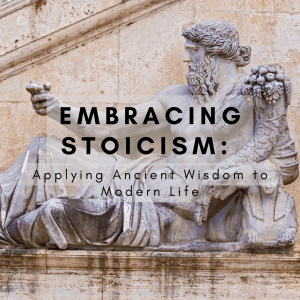In a world characterized by constant change and uncertainty, many individuals seek guidance and a sense of inner tranquility. While modern self-help books and motivational speakers offer various solutions, there is a timeless philosophy that has withstood the test of time: Stoicism. Originating in ancient Greece and Rome, Stoicism provides a practical framework for navigating the complexities of life and finding enduring happiness. Despite its ancient roots, Stoicism remains highly relevant today, offering valuable insights and practical techniques for individuals seeking to enhance their well-being and lead a meaningful life. In this article, we will explore the core principles of Stoicism and examine how they can be applied to our modern lives.
At its core, Stoicism is a philosophy that emphasizes the importance of living in accordance with nature and developing resilience in the face of adversity. The Stoics believed that the key to lasting happiness lies in cultivating virtue, exercising reason, and accepting the things we cannot control. They viewed external circumstances as largely indifferent, placing greater emphasis on one’s inner character and the development of personal virtues such as wisdom, courage, temperance, and justice.
One of the central tenets of Stoicism is the dichotomy of control, which encourages individuals to focus their energy on what they can control and accept with equanimity the things they cannot. This concept is particularly relevant in today’s fast-paced and unpredictable world. We often find ourselves consumed by external events and circumstances that are beyond our control, leading to frustration, anxiety, and a sense of helplessness. By embracing the Stoic perspective, we can shift our focus to the aspects of life that we have agency over, such as our thoughts, attitudes, and actions. This shift in mindset allows us to find a sense of inner peace and maintain a positive outlook, even in the face of adversity.
Another fundamental principle of Stoicism is the practice of negative visualization. This technique involves contemplating the impermanence of things we often take for granted, such as our health, relationships, and material possessions. By imagining the loss of these things, we develop a greater appreciation for what we have and reduce our attachment to external outcomes. Negative visualization helps us cultivate gratitude, resilience, and a deeper understanding of the transient nature of life. In a society that often prioritizes material possessions and instant gratification, this practice offers a powerful antidote to discontent and fosters a sense of contentment in the present moment.
Stoicism also emphasizes the importance of distinguishing between what is within our control and what is not. While we may not be able to control external events or the actions of others, we have complete control over our own thoughts, attitudes, and responses. This principle aligns with the field of cognitive psychology and the concept of cognitive reframing, which suggests that by changing our perspective and interpretation of events, we can alter our emotional response. By applying Stoic principles, we can develop a greater sense of self-awareness and consciously choose how we interpret and react to life’s challenges. This empowers us to respond to adversity with resilience, composure, and wisdom.
Stoicism also offers valuable insights into the nature of desire and the pursuit of pleasure. The Stoics believed that true happiness does not lie in the accumulation of external goods or the pursuit of fleeting pleasures but rather in the cultivation of inner virtues and the pursuit of moral excellence. This does not mean rejecting pleasure altogether but rather recognizing that true fulfillment comes from living in accordance with our values and exercising self-discipline. By detaching ourselves from the relentless pursuit of external desires, we free ourselves from the perpetual cycle of dissatisfaction and find contentment in the present moment.
The Stoic philosophy also encourages us to develop a sense of duty and responsibility towards others. Stoics believed in the inherent interconnectedness of humanity and emphasized the importance of treating others with kindness, compassion, and justice. In today’s interconnected world, where divisiveness and self-interest often prevail, adopting a Stoic perspective can help foster a sense of empathy and promote a more harmonious society. By embracing Stoic virtues such as justice, fairness, and benevolence, we can contribute to the well-being of others and create a positive ripple effect in our communities.
Stoicism offers a timeless philosophy that remains highly applicable and relevant in our modern lives. By embracing its core principles, we can cultivate resilience, inner tranquility, and a deeper sense of purpose. Stoicism provides a practical framework for navigating the complexities of life, emphasizing the importance of focusing on what is within our control, practicing negative visualization, and cultivating virtues. In a world characterized by uncertainty and constant change, the wisdom of the Stoics serves as a guiding light, reminding us of the enduring importance of personal growth, self-mastery, and the pursuit of moral excellence. Embracing Stoicism can be a transformative journey that empowers individuals to live more meaningful, fulfilled lives in the face of life’s inevitable challenges.





